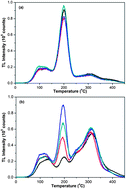Controlled synthesis of Li2B4O7:Cu for temperature sensing†
Abstract
With the aim of developing a new phosphor for temperature sensing, the effect of different annealing processes and co-dopants (Ag, In, Dy or Ti) on the TL properties of copper-doped Li2B4O7 synthesized by Solution Combustion Synthesis was investigated. Compared with slow annealing, fast annealing induces a high temperature peak (∼310 °C) in the TL curve of Li2B4O7:Cu. The defect structure of Li2B4O7:Cu synthesized by fast annealing is not reproducible, resulting in high sample-to-sample variability in the TL curves. We tested In, Dy, Ti or Ag as co-dopants in Li2B4O7:Cu and found that Ag co-doping resulted in increased TL intensity and reproducible TL curves from sample to sample. In addition, the relative intensity of the main TL peak at ∼200 °C can be controlled by adjusting the Ag doping concentration. Finally, the effect of light exposure on irradiated samples and the room temperature fading over time have been examined. Li2B4O7:Cu,Ag showed low room light sensitivity and almost no fading over a 24 h storage period in the dark. These features support the application of Li2B4O7:Cu,Ag for temperature sensing.


 Please wait while we load your content...
Please wait while we load your content...